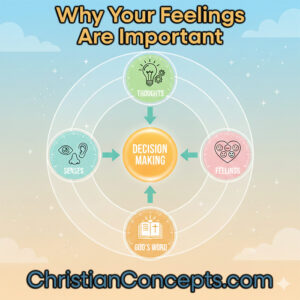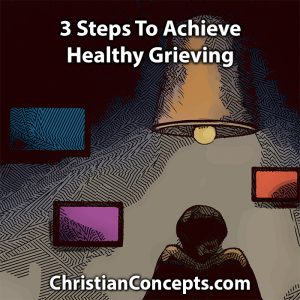Learn how to treat your feelings as vital data points and partner them with Biblical truth to make healthier, more discerning life decisions.
Your emotions are part of the complete package God provided. You have a body with five senses, you have thoughts, and you have feelings. None of these exist in a vacuum; they are designed to work together to help you navigate a complex world.
There isn’t anything wrong with your feelings. However, problems arise when we either ignore them entirely or interpret them as absolute commands. To live a discerning life, we must learn to see feelings as Information, not Instruction.
Feelings as Internal Senses
Your feelings provide information just like your physical senses. If something smells bad, you use that information to help you make a decision. If you smell smoke, your “smell data” suggests there might be a fire.
The trouble starts if you bias the information to favor the decision you want to make. If you want to stay in a warm house despite the smoke, you might try to convince yourself the smell isn’t objective. Conversely, if you overly value a single sense, you miss out on the full reality. Some foods smell bad but are actually good for you. Some foods have a strange texture but taste wonderful. If you prioritize texture above all else, your “data” is incomplete.
Our emotions work the same way. They are like a dashboard in a car—the “Check Engine” light isn’t the problem; it’s simply a report on the state of the engine. We must understand that emotions are never sinful, while also realizing they are only one part of the dashboard.
The Brownie Bias: Decoding Your History
When I was a child, I had some bad food experiences with brownies and roasted pumpkin seeds on separate occasions. To this day, I sometimes feel queasy before I eat these foods.
My feelings are giving me “data”: Danger! This made us sick before! But unless all brownies in the world are poisoned, my feeling is biased. It’s a “false positive” based on past pain. If I let that feeling be my only instructor, I miss out on a perfectly good dessert.
We all have “Brownie Biases” in our relationships and spiritual lives. A past hurt might make you feel “queasy” about trusting a new friend or a new church. In those moments, you have to ask a difficult question: Should these feelings be trusted or discounted? Is the feeling a valid warning, or is it just an old memory ringing an alarm bell?
Fact vs. Fiction: The Art of Discernment
God made your feelings, so they must be important. They are meant to work in partnership with your other senses and your intellect. Then, through your ability to discern fact from fiction, you can correctly interpret all the input you’ve gathered to make a godly decision.
Life becomes interesting when strong feelings come into conflict with the truth. This is the exact tension Adam and Eve faced in Genesis 3. Eve felt the fruit was desirable; she saw it was pleasant. Her sensory data was screaming “Yes!” but God’s word had said “No.”
Deception often thrives in the gap between what we feel and what is true. When these two are in conflict, we have to decide which one to prioritize. Sometimes, we must lean on the truth to lead our feelings; other times, a “negative” feeling is actually God’s way of pointing us toward a truth we are trying to ignore. In fact, there are 2 helpful no-guilt negative emotions that are specifically designed to lead us back to a right path.
Reflection and Application
Your emotions aren’t an obstacle to a spiritual life; they can actually be a bridge to a deeper understanding of yourself and God. But to use that bridge, you must be willing to look at them objectively.
As you go through this week, reflect on the “data” your heart is sending you:
- Check the Bias: Have you ever been absolutely sure of something because of a “gut feeling,” only to find out you were wrong? What was the bias behind that feeling?
- Consult the Dashboard: Are you treating your feelings as Information (something to be weighed) or Instruction (something that must be obeyed)?
- Bridge or Obstacle: In your current situation, is your emotion an obstacle or a bridge to the truth?
God wants the “complete package” of who you are—body, mind, and spirit—to be aligned with His truth. Don’t be afraid to consider all the data God has provided.
Last updated 20260215
Image created using Gemini
































